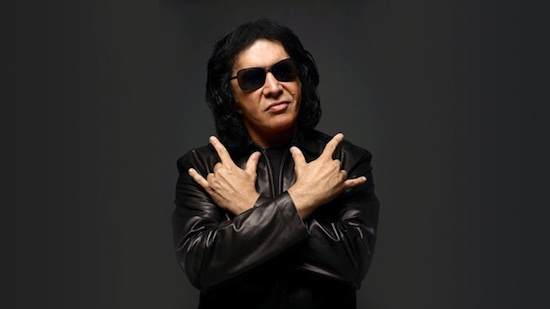It must be so freeing to be Gene Simmons. To have pursued your dreams and your fortune in an entirely selfish manner without feeling a hint of guilt for the toes that may have crumbled under your platform boots on the way. You can call Gene Simmons a lot of things. Obnoxious, arrogant, a frequent contrarian, but the man is pretty far off from being an idiot. He also has to be one of the most straightforward men in music, for better or worse.
He is what he is: a self-serving and shrewd business man of many, many, many strong opinions. I get the feeling that even if he hadn’t become a massive rock star, he would not have turned out the least bit different – and would likely have slick-talked his way to the top of something or other, regardless.
Much of this list reads like a basic music history lesson – partially down to the man’s obvious love of a great story, but possibly also down to a misperception of youth = ignorance in his immediate audience – and the other half is like a 101 class in music business. Much of what he admires in other artists is their independence, their success and the role that their musical and visual aesthetic may contribute to that. He is a man who likes to trade in icons, denouncing his perceived lack of them today and proudly saying that he thinks Kiss are seen more as iconic imagery than as musicians, and that he is totally okay with that. Though I guess there is nothing less to be expected from a man who has an honest-to-goodness trademark on his own face.
There really is no denying the icon status of that face, however. Well, at least the face of the Demon persona Simmons created around 40 years ago. I, like the thousands of other offspring of Kiss Army members in North America, grew up with it everywhere: staring out of vinyl sleeves, popping off baseball caps, even crafted into ceramic incense burners that directed smoke to pour out of its gaping mouth and nostrils. Beyond its specific association with Kiss as a musical entity, The Demon’s face has actually become the equivalent of a rock stock pic – right up there with throwing up the devil horns. Of course, Simmons couldn’t be more proud as he shows me pictures on his phone snapped around the world of The Demon looming over carnival entrances and graffitied onto walls; he even keeps them right by photos of his own children.
The popular opinion of Simmons – one of his own making – is that the music doesn’t matter to him anymore. It’s easy to forget that Simmons is, in fact, NOT shit at playing the bass, and he actually studied his craft quite diligently. Dressed To Kill, Destroyer and the recently-reissued Love Gun all have a smattering of excellent tunes – albeit within their narrow range – and the bassline on ‘Detroit Rock City’ is a prime example of careful structuring. It’s easy to forget all this because rarely are Simmons’ positive opinions on music well publicised, especially given his tendency to rouse the rabblers with sweeping "rock is dead"-type statements, not to mention his incredible, Duke of Edinburgh-worthy gaffe game (he’s already covered publicly insulting mental illness and immigrants just in the last six months). But chatting here on his favourite records, Simmons singles out his favourite bass moments, from Ronnie Wood’s off-kilter noodling on Truth to the effect a sudden switch from guitar had on Noel Redding. He also geeks out on the different recording processes these musicians use, from the overly simple to the inexcusably complex. However, in regular Simmons fashion, there is still plenty a tongue-lashing to be witnessed.
Click on his image below to begin scrolling through Gene’s choices


